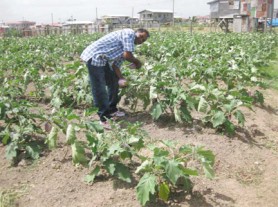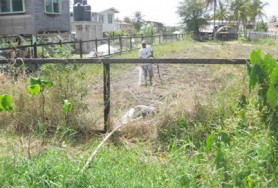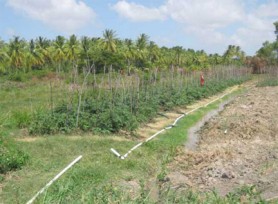Even as farmers remain pressured by El Nino, consumers have been enjoying cheap prices for vegetables because of a glut that is adding to the woes of cash crop farmers in West Berbice who are struggling to cope with the high cost of production.

In a recent interview with Stabroek News farmers said they were forced to drop their prices because of a “surplus” of produce in the market. They said the market has also contracted “because everybody is planting now.”
The farmers supply the middlemen, who in turn sell to the vendors. But farmers are complaining that they did all the hard work then waited for about four months for their produce to be ready for the market; now instead of reaping the benefit they are earning the least.
The farmers said they incurred additional expenses to pump water from the trenches where available and to purchase chemicals to control insects and diseases associated with the dry weather.
The surplus, the farmers said resulted from the Grow More Food campaign initiated by the Ministry of Agriculture. While the farmers were pleased with the initiative, they complained that “people hardly buying so we have to sell the greens cheap…”

They said too, “It is good that almost everyone is planting but what would happen to the real farmers? We can barely survive on the little we are making.”
The pointed out that with the glut on the local market, government should have ensured that there is adequate overseas market for the produce.
According to them the New Guyana Marketing Corporation (GMC) is assisting by buying some farmers’ produce for resale “but they can only take a certain amount.”
Besides, the GMC is “purchasing mostly items with longer shelf-life like pumpkin and coconut. They don’t have overseas market for the perishable items,” the farmers claim.
A few farmers from the Number Two/Cotton Tree area who farm in the backlands told this newspaper they “don’t think El Nino is affecting the cash crop that much; it is just driving up the cost of production. There is enough greens everywhere; we don’t have a shortage as would normally happen with this weather.”

Some said their farms are located close to the trench in the backlands and they are getting enough water for their crops but they have to spend more money to pump it. They also had to extend their hoses.
The price for pesticides, they said has also seen an increase “but the price for our produce is going down.”
They said though that some persons who are not farming close to the trench – which badly needs clearing – are having difficulty accessing water. One such farmer was Hansraj Seepersaud of Number Two Village who farms in the backlands and in the residential area.
When this newspaper visited his farm in the residential area last week he was pumping water from a small trench to water bora he had just planted.
He said he does not get water so easily for his farm in the backlands as it is far away from the trench. He has lost 8,000 roots of cabbage some of which had diseases and some “burn by the heat.”
Seepersaud is afraid that if the dry weather continues for a few weeks more he would be out of business.
Two other cash crop farmers from Bath Settlement that this newspaper spoke to: Mohamed Hussain and Hemchand Kandhai said since the dry weather started they have not been able to access water and were forced to stop planting.
They said “right now the trench in the area dry up and we waiting on the rain…”
Kandhai said they were accessing water from “Larico trench [located in the backdam] but the rice farmers block it to pump water in their fields; they have the first priority.”
He explained that a few years ago the village council dug a smaller trench “to bring in water from the Larico trench [even when it is blocked] but it has to reach a certain level first before we can get it. Right now the level is low.”
Kandhai who also owns a few head of sheep had taken them to the Bath Experiment area to graze when this newspaper caught up with him.
The grass he said was drying up and the sheep have to go a far way into the backdam to graze. Luckily the animals get water from the GuySuCo canal nearby.
Ganesh Kumar of Bath Experiment also accesses water from the same canal which is close to his cash crop farm. He proudly said that his crops were blooming and when this newspaper visited he was reaping boulangers from his farm.
Currently, middlemen are purchasing pumpkin from farmers at $5 for per pound and wiri wiri peppers at $30 per pint. They are also paying $60 per pound for cabbage and $100 for about eight squashes.
Meanwhile, some housewives said they were happy that the vegetables are available in abundance and were “selling reasonable.”








